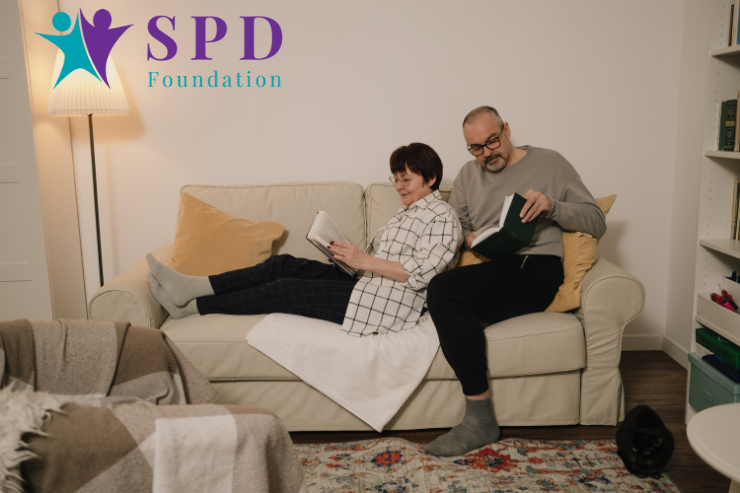Online therapy is a service providing mental health support over the internet. Over the years, this novel mode of treatment has helped millions all over the world to feel better without having to step out of their homes.
The primary tools used for communication in online therapy include email, text messaging, video conferencing, telephone, or real-time instant messaging.
Despite its limitations (see here at psychology.org), teletherapy has become an important health treatment source and the number of users is growing day by day.
Effectiveness of Online Therapy for SPD
Online therapy has proven to be a supportive tool for managing SPD, alongside traditional methods such as occupational therapy and sensory integration practices. It provides an accessible option for those who face barriers to traditional therapy, such as stigma or geographical limitations.
Websites like bestonlinetherapy.com list various online therapy options that offer behavior therapy digitally, making it easier for individuals with SPD to receive treatment in a comfortable setting.
The Benefits of Online Therapy for SPD:

- Educational Insight: Online therapy educates individuals about SPD and its implications, enhancing understanding of how it affects everyday activities.
- Development of Coping Mechanisms: Therapists assist clients in developing strategies to handle sensory overload and other SPD-related challenges effectively.
- Enhancement of Self-Esteem: By improving self-management skills, online therapy helps individuals gain confidence and fosters a greater sense of self-acceptance.
- Support for Families: Online sessions can also provide invaluable support for families, helping them understand SPD better and how to support their loved ones.
- Improvement in Quality of Life: Through tailored therapeutic strategies, individuals learn to better manage their symptoms, leading to enhanced well-being.
- Emotional and Stress Regulation: Online therapy aids in managing stress, regulating emotions, and improving communication with family and friends.
Addressing SPD Symptoms Through Online Therapy
Online therapy can effectively address a range of SPD symptoms, from sensory modulation issues to social challenges and emotional regulation. This approach can significantly improve the ability to handle everyday tasks and interactions.
Children and Teenagers with SPD:

latforms such as BetterHelp, TeenCounseling, and Talkspace specialize in connecting children and teenagers with therapists who can address SPD-specific needs within suitable budgetary limits.
These services are particularly crucial post-pandemic, as young individuals navigate additional challenges like peer pressure and hormonal changes.
Additional Resources and Support for SPD
Online communities and support groups are invaluable for individuals dealing with Sensory Processing Disorder. These platforms provide a safe space for sharing experiences, advice, and coping strategies. Members can connect with others who understand their challenges firsthand, reducing feelings of isolation and misunderstanding that often accompany SPD.
Key Benefits of Online Support for SPD:
- Peer Support: Interacting with others who face similar sensory challenges can provide emotional comfort and practical advice. These interactions often lead to the development of new coping techniques and a deeper understanding of managing daily life with SPD.
- Resource Sharing: Members of these communities frequently share resources such as articles, research findings, and therapy tools that have been beneficial. This shared knowledge can be particularly helpful for those new to the SPD diagnosis or those looking to expand their support toolkit.
- Professional Guidance: Some online groups are moderated or visited by professionals who specialize in SPD. These experts can offer guidance, answer questions, and provide professional insights that enhance the group’s overall knowledge and support capabilities.
- Awareness and Advocacy: Online communities often engage in awareness campaigns to increase the understanding of SPD within the wider community. This advocacy is crucial for improving the acceptance of individuals with SPD and can lead to better support systems in educational, professional, and social environments.
- Accessibility: Virtual support groups are accessible from anywhere with an internet connection, making them a vital resource for those in remote or underserved areas where in-person SPD support services might be limited.
Types of Online Platforms for SPD Support:

- Social Media Groups: Platforms like Facebook, Reddit, and others host numerous SPD-related groups. These groups vary in focus, some are geared towards parents of children with SPD, while others are intended for adults navigating life with the disorder.
- Dedicated SPD Forums: Websites dedicated to SPD often have forums where individuals can post questions, participate in discussions, and write about their personal experiences. These forums may also organize virtual meetups, webinars, and workshops.
- Online Therapy and Counseling Services: Many online therapy platforms now offer group therapy sessions and forums as part of their services, providing structured support led by licensed therapists who specialize in SPD and other sensory issues.
- Webinars and Online Workshops: Educational webinars and workshops provide valuable information on the latest SPD research, treatment techniques, and management strategies. These sessions are often led by experts in the field and offer up-to-date, evidence-based information.
Choosing the Right Support Network
When selecting an online support community, it’s important to consider the group’s focus, privacy settings, moderation quality, and the overall tone of interactions. A supportive, well-moderated group with active participation can serve as a tremendous resource, helping individuals with SPD navigate their symptoms more effectively and feel less alone in their journey.
Conclusion

Online therapy offers a flexible, accessible solution for managing Sensory Processing Disorder, providing a range of benefits from educational resources to emotional support.
It is an effective alternative for those who prefer or require therapy in a non-traditional setting, empowering individuals with SPD to lead more fulfilling lives.







